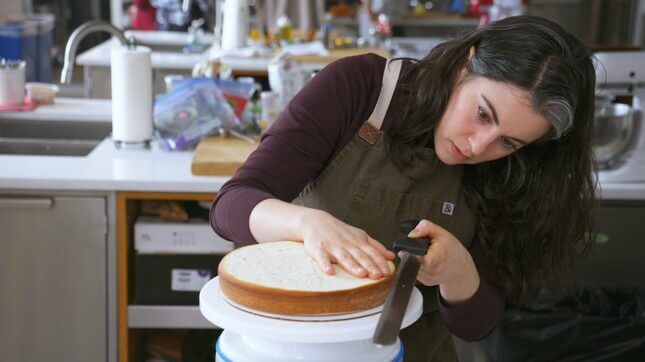Bon Appétit's Claire Saffitz Will Teach You How to Bake a Cake
Latest

If you were to go to YouTube and let the algorithm guide you towards some content, much of what it suggests will be complete shit, and this is especially true of food and cooking content. It will recommend videos of food ‘hacks’ teaching you to make an orange into a cube for some reason, or titles like “I Baked Lipstick Into A Cake.” Even videos of actual recipes tend towards the ridiculous: The Epic Meal Time genre of too-big, calorie-packed bullshit, or dishes that seem to be designed by a 7-year-old whose idea of dessert is All My Favorite Candy Bars At Once.
Amid this sea of garbage, there is a bright spot: Bon Appétit, and its wildly successful YouTube channel. Their stars have garnered a cult following online—one BuzzFeed headline read “Bon Appétit’s Test Kitchen Chefs Are The Only YouTube Stars I Care About,” and there’s even a subreddit dedicated just to Brad Leone, the star of their “It’s Alive” series. According to Condé Nast, which owns Bon Appétit, the channel had 340 million views on YouTube last year.
What sets the channel apart is the test kitchen staff’s personalities. The top comments on most of their videos aren’t about pizza techniques or debating the best kind of cheese, but how much they love the hosts. The interactions between the hosts are so loved that fans have even made supercuts of their “best moments.” You really feel like you know them; there’s an atmosphere of easy, laid-back camaraderie which doesn’t feel forced.
But perhaps the most loved host is Claire Saffitz. “I’d watch Claire boil water,” reads the top comment on a video of Claire making birthday cake. “Can’t resist clicking on Claire,” reads another; just the comment itself got 3.4k upvotes.
Claire’s series “Gourmet Makes” sees her recreating gourmet versions of beloved snack foods, from Oreos and Twinkies to Gushers and Skittles, and it’s easy to see why she’s so loved. Rarely do the recipes go off without a hitch; we usually see her fail at least a couple times before she finally nails it, which she always does. She frowns and sighs, and gives the camera conspiratorial looks as she claims to her colleagues that no, she doesn’t actually need to temper the chocolate for a Reese’s peanut butter cup.
Today, Bon Appétit will debut a new series hosted by Claire, sure to thrill her fans: “Bon Appétit’s Baking School,” where she’ll teach viewers how to bake. In this season, Claire will take on cakes. Each part of the five-episode season will go through a different aspect of cake-making, from baking the layers to frosting and decorating them. We spoke with Claire about being beloved by all, why she loves baking, and—of course—the Great British Bake Off.
This conversation has been condensed and lightly edited for clarity.
JEZEBEL: So before we talk about the new show, I just want to talk a little bit about Gourmet Makes, because I love it.Claire Saffitz: Thanks!
-

-

-

-

-

-

-

-

-

-

-

-

-

-

-

-

-

-

-

-

-

-

-

-

-

-

-

-

-

-

-

-

-

-

-

-

-

-

-

-








































